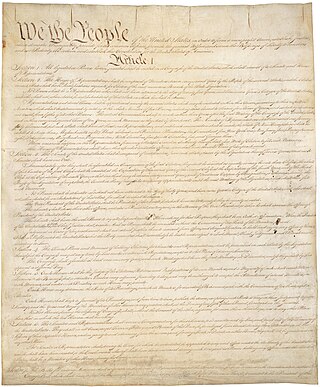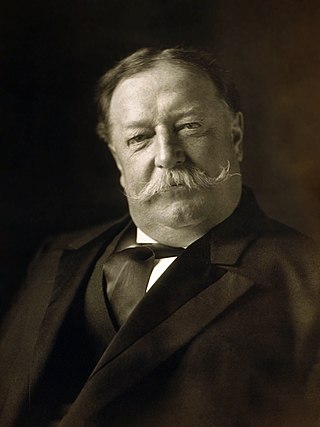Related Research Articles

The International Court of Justice, or colloquially the World Court, is the only international court that adjudicates general disputes between nations, and gives advisory opinions on international legal issues. It is one of the six organs of the United Nations (UN), and is located in The Hague, Netherlands.
The International Prize Court was an international court proposed at the beginning of the 20th century, to hear prize cases. An international agreement to create it, the Convention Relative to the Creation of an International Prize Court, was made at the Second Hague Conference in 1907 but never came into force.

The Constitution of the United States is the supreme law of the United States. It superseded the Articles of Confederation, the nation's first constitution, on March 4, 1789. Originally including seven articles, the Constitution delineates the frame of the federal government. The Constitution's first three articles embody the doctrine of the separation of powers, in which the federal government is divided into three branches: the legislative, consisting of the bicameral Congress ; the executive, consisting of the president and subordinate officers ; and the judicial, consisting of the Supreme Court and other federal courts. Article IV, Article V, and Article VI embody concepts of federalism, describing the rights and responsibilities of state governments, the states in relationship to the federal government, and the shared process of constitutional amendment. Article VII establishes the procedure subsequently used by the 13 states to ratify it. The Constitution of the United States is the oldest and longest-standing written and codified national constitution in force in the world.

William Howard Taft served as the 27th president of the United States from 1909 to 1913 and the tenth chief justice of the United States from 1921 to 1930, the only person to have held both offices.

An unlawful combatant, illegal combatant or unprivileged combatant/belligerent is a person who directly engages in armed conflict in violation of the laws of war and therefore is claimed not to be protected by the Geneva Conventions. The International Committee of the Red Cross points out that the terms "unlawful combatant", "illegal combatant" or "unprivileged combatant/belligerent" are not defined in any international agreements. While the concept of an unlawful combatant is included in the Third Geneva Convention, the phrase itself does not appear in the document. Article 4 of the Third Geneva Convention does describe categories under which a person may be entitled to prisoner of war status. There are other international treaties that deny lawful combatant status for mercenaries and children.

The Inter-American Court of Human Rights is an international court based in San José, Costa Rica. Together with the Inter-American Commission on Human Rights, it was formed by the American Convention on Human Rights, a human rights treaty ratified by members of the Organization of American States (OAS).

The Hague Conventions of 1899 and 1907 are a series of international treaties and declarations negotiated at two international peace conferences at The Hague in the Netherlands. Along with the Geneva Conventions, the Hague Conventions were among the first formal statements of the laws of war and war crimes in the body of secular international law. A third conference was planned for 1914 and later rescheduled for 1915, but it did not take place because of the start of World War I.

Mahmoud Cherif Bassiouni was an Egyptian-American emeritus professor of law at DePaul University, where he taught from 1964 to 2012. He served in numerous United Nations positions and served as the consultant to the US Department of State and Justice on many projects. He was a founding member of the International Human Rights Law Institute at DePaul University which was established in 1990. He served as president from 1990 to 1997 and then as president emeritus. Bassiouni is often referred to by the media as "the Godfather of International Criminal Law" and a "war crimes expert". As such, he served on the Steering Committee for The Crimes Against Humanity Initiative, which was launched to study the need for a comprehensive convention on the prevention and punishment of crimes against humanity, and draft a proposed treaty. He spearheaded the drafting of the proposed convention, which as of 2014 is being debated at the International Law Commission.
Hamdan v. Rumsfeld, 548 U.S. 557 (2006), is a United States Supreme Court case in which the Court held that military commissions set up by the Bush administration to try detainees at Guantanamo Bay violated both the Uniform Code of Military Justice (UCMJ) and the Geneva Conventions ratified by the U.S.

International criminal law (ICL) is a body of public international law designed to prohibit certain categories of conduct commonly viewed as serious atrocities and to make perpetrators of such conduct criminally accountable for their perpetration. The core crimes under international law are genocide, war crimes, crimes against humanity, and the crime of aggression.
Northern Pipeline Construction Company v. Marathon Pipe Line Company, 458 U.S. 50 (1982), is a United States Supreme Court case in which the Court held that Article III jurisdiction could not be conferred on non-Article III courts.

Arbitration is a formal method of dispute resolution involving a third party neutral who makes a binding decision. The third party neutral renders the decision in the form of an 'arbitration award'. An arbitration award is legally binding on both sides and enforceable in local courts, unless all parties stipulate that the arbitration process and decision are non-binding.

The Martens Clause is an early international law concept first introduced into the preamble of the 1899 Hague Convention II – Laws and Customs of War on Land. There are differing interpretations of its significance on modern international law, with some scholars simply treating the clause as a reminder international customary law still applies after a treaty is ratified while others take a more expansive approach where the clause provides that because international treaties cannot be all encompassing, states cannot use that as a justification for an action.
Nullification, in United States constitutional history, is a legal theory that a state has the right to nullify, or invalidate, any federal laws that they deem unconstitutional with respect to the United States Constitution. There are similar theories that any officer, jury, or individual may do the same. The theory of state nullification has never been legally upheld by federal courts, although jury nullification has.
Air warfare must comply with laws and customs of war, including international humanitarian law by protecting the victims of the conflict and refraining from attacks on protected persons.

The presidency of William Howard Taft began on March 4, 1909, when William Howard Taft was inaugurated as 27th president of the United States, and ended on March 4, 1913. Taft was a Republican from Ohio. The protégé and chosen successor of President Theodore Roosevelt, he took office after easily defeating Democrat William Jennings Bryan in the 1908 presidential election. His presidency ended with his landslide defeat in the 1912 election by Democrat Woodrow Wilson, after one term in office.
A peace congress, in international relations, has at times been defined in a way that would distinguish it from a peace conference, as an ambitious forum to carry out dispute resolution in international affairs, and prevent wars. This idea was widely promoted during the nineteenth century, anticipating the international bodies that would be set up in the twentieth century with comparable aims.

The Geneva Conventions are international humanitarian laws consisting of four treaties and three additional protocols that establish international legal standards for humanitarian treatment in war. The singular term Geneva Convention colloquially denotes the agreements of 1949, negotiated in the aftermath of the Second World War (1939–1945), which updated the terms of the two 1929 treaties and added two new conventions. The Geneva Conventions extensively define the basic rights of wartime prisoners, civilians and military personnel; establish protections for the wounded and sick; and provide protections for the civilians in and around a war-zone.

Justice Jean-Paul Beraudo is a lawyer, academic and author of legal works. He was Justice at the French Supreme Court and vice-chairman of the International Court of Arbitration. He lectures on International Private Law and International Trade Law at Panthéon-Sorbonne University and on Company law at Sciences-Po, Paris. The International Institute for the Unification of Private Law (UNIDROIT) appointed him correspondent for France and a member of the scientific committee.

The Hague Judgments Convention, formally the Convention of 2 July 2019 on the Recognition and Enforcement of Foreign Judgments in Civil or Commercial Matters is an international treaty concluded within the Hague Conference on Private International Law. It was concluded in 2019, and entered into force on 1 September 2023 for the European Union and Ukraine. The convention governs the recognition of judgements in civil and commercial matters.
References
- ↑ "Joint Meetings, Joint Sessions, & Inaugurations | US House of Representatives: History, Art & Archives". history.house.gov. Retrieved 21 October 2024.
- ↑ "Annual Message to Congress (1910)". Teaching American History. Retrieved 2024-12-02.